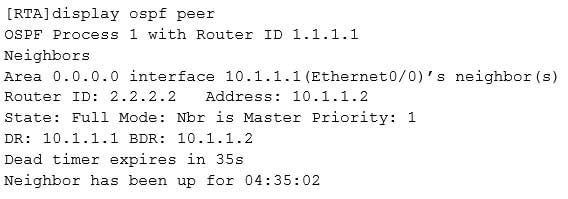H12-224 : HCNP-R&S Fast Track (Huawei Certified Network Professional – Routing & Switching Fast Track) : Part 18
-
What is the maximum bits of a Class C address can be used for subnet?
- 6
- 8
- 12
- 14
-
Which of the following statements about the setup of a BFD session are true? (Choose three.)
- A BFD session can be set up in either static or dynamic mode.
- A static BFD session is set up by manually configuring BFD session parameters and delivering requests for setting up a BFD session. BFD session parameters include the local and remote discriminators.
- A dynamic BFD session is set up by dynamically allocating local discriminators.
- Static and dynamic BFD sessions are not differentiated.
-
Which of the following statements about the Smart Link group is false?
- A Smart Link group has two interfaces at most. The two interfaces if configured are an active interface and a standby interface.
- Among the two interfaces in a Smart Link group, one is in the active state and the other one in the standby state in normal situations.
- When the active interface goes down, the Smart Link group automatically blocks it and changes the status of the standby interface to active.
- When the active interface recovers from a fault, traffic will be switched back to it immediately.
-
Different from a Stub area, an NSSA supports Type-5 LSAs.
- True
- False
-
Which of the following are characteristics of a high availability network? (Choose two.)
- Faults seldom occur.
- Services can be quickly restored when a fault occurs.
- Faults never occur.
- Services can only be manually restored when a fault occurs.
-
Which of the following statements about NSSA commands is false?
- If the default-route-advertise parameter is set, a Type-7 default route is generated.
- The no-import-route parameter is used to prevent the importing of AS external routes in the form of Type-7 LSAs into an NSSA.
- The no-summary parameter is used to prevent the advertisement of Type-3 and Type-4 LSAs in an area.
- The set-n-bit parameter indicates that an N-bit will be set in a DD packet.
-
Which of the following Statement is false?

H12-224 HCNP-R&S Fast Track (Huawei Certified Network Professional – Routing & Switching Fast Track) Part 18 Q07 021 - The OSPF Router ID of the local router is 1.1.1.1.
- The OSPF Router ID of the neighbor is 2.2.2.2.
- The OSPF Router ID of the neighbor is larger and thus the neighbor acts as a DR.
- The local router acts as slave.
-
One class B network 155.16.0.0, the mask is 255.255.255.192. then subnet quantity available is ( ), the host quantity in every subnet at most is ()
- 512126
- 102464
- 102462
- 256254
- 192254
-
The NBMA mode requires all the routers in the network to be fully connected; otherwise, it does not function.
- True
- False
-
Which of the following statements about the BFD echo function are true? (Choose three.)
- The local system sends a series of BFD Echo packets, and the remote system loops the packets back through its forwarding channel.
- If the local system receives several consecutive Echo packets, it advertises a session Down event.
- The echo function can work together with the asynchronous or demand detection mode.
- The echo function can take the place of fault detection by sending BFD control packets.
-
Which of the following statements about VLSM characteristics are true? (Choose two.)
- VLSM supports both IPv4 and IPv6.
- VLSM supports overlapped address ranges.
- VLSM provides more proper route summarization information in the routing table.
- VLSM allows a subnet to be divided into smaller subnets.
-
Which of the following statements about the BFD demand mode are true? (Choose two.)
- The local system periodically sends BFD control packets, and the remote system detects the BFD control packets sent from the local system.
- The local system detects the BFD control packets sent by itself.
- If one system does not receive any BFD packets from its peer within a detection period, it advertises a session Down event.
- Each system confirms its connections with other systems in a particular method. After a BFD session is set up, BFD control packets are no longer sent.
-
Different types of networks cannot establish an adjacency in the Full state.
- True
- False
-
A Class C network needs to be divided into five subnets and each subnet needs to contain a maximum of 20 hosts. Which of the following subnet masks is used?
- 255.255.255.192
- 255.255.255.240
- 255.255.255.224
- 255.255.255.248
-
How many Class C networks does the summarized route 192.168.134.0/22 cover?
- 2
- 4
- 8
- 16
-
When two routers exchange LSDB information by exchanging DD packets, a master/slave relationship is established between the two routers. The router with a larger router ID is the master.
- True
- False
-
The subnet mask of a class A address is 255.255.240.0, how many bits are used to divide subnet?
- 4
- 5
- 9
- 12
-
In VRP 5.7, which of the following dynamic protocols support GR? (Choose three.)
- MPLS LDP/RSVP
- IS-IS/OSPF
- BGP
- MSTP
-
Which of the following address types are reserved for multicast use?
- Class A
- Class B
- Class E
- Class D
-
Which of the following messages exist only in PIM-SM? (Choose two.)
- Join/Prune
- Assert
- Bootstrap
- Register
Subscribe
0 Comments
Newest